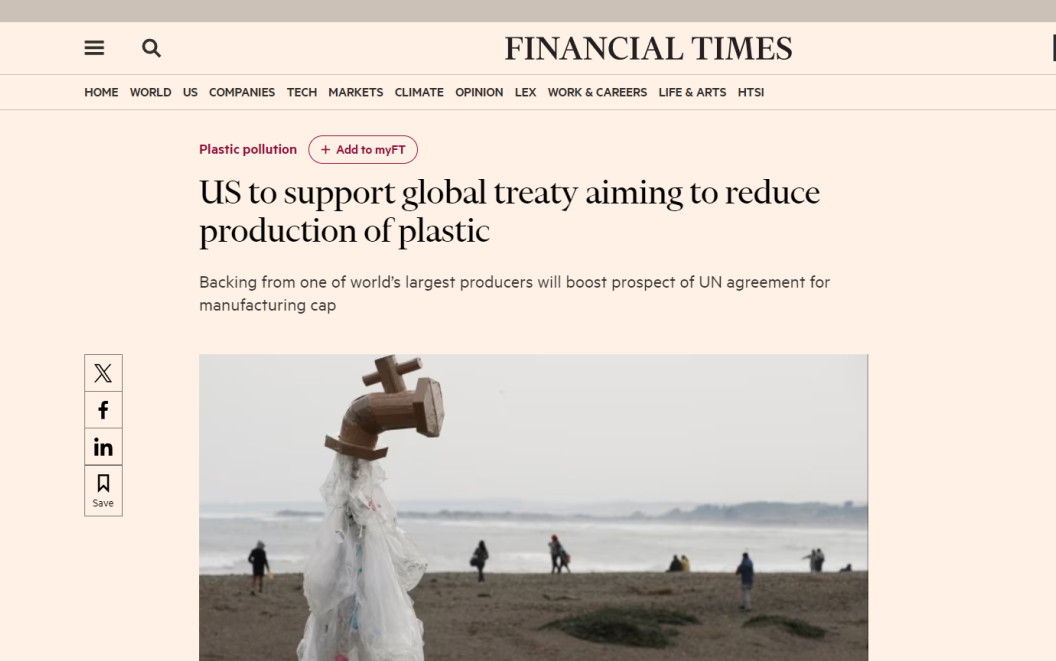Better Touch Better Business
Contact Sales at XINCHUANG BIO.
The United States supports the global plastic reduction treaty to promote new progress in international plastic pollution control
According to the Financial Times, the US government recently said it would support a global treaty calling for a reduction in the amount of plastic produced each year. The decision not only represents a major shift in U.S. policy, but also significantly improves the chances of an international consensus on tackling plastic pollution. As one of the world's largest plastic producers, this move by the United States is crucial to shaping a United Nations treaty on plastic waste management that will be finalized by the end of this year.
Although the United States had joined China and Saudi Arabia in opposing the inclusion of restrictions on plastic production in the treaty at United Nations talks earlier this year, in favor of a focus on recycling and reuse, its position shifted as scientists made new findings about the dangers of plastic, according to American officials. The change coincides with the timing of final negotiations to be held in South Korea in November.
Developing countries, especially in Asia and Africa, have long been the main recipients of plastic waste worldwide, and large amounts of plastic waste in these countries often end up in landfills or incineration, causing serious environmental and health problems. As big consumer goods companies rely on plastic packaging, more voices are calling for the onus to be placed on producers to tackle plastic pollution.
However, the US petrochemical industry has criticized the UN-led cap on plastic production. ExxonMobil, one of the world's largest plastic producers, pointed out in April that limiting plastic production would not reduce pollution and could lead to higher CO2 emissions from alternatives. The American Chemistry Council (ACC) also expressed concern, noting that plastics play a "critical" role in modern medicine, the provision of clean drinking water, reducing transportation energy needs and preventing food waste
The American Chemistry Council (ACC) said in a statement that the Biden administration's support for production caps in the UN plastics agreement "demonstrates its willingness to betray American manufacturing." They further emphasized that the world will need more plastic, not less, if the U.S. government wants to meet its goals for sustainability and combating climate change.
The U.S. government's policy shift comes as scientists continue to reveal the serious harm plastic can do to human health. A recent report published in the Annals of Global Health states that "every chemical associated with plastics" is associated with "at least one adverse health outcome." Scientists and regulators are particularly concerned about "permanent chemicals" such as perfluorinated and polyfluoroalkyl substances (PFAS), which never fully degrade in the environment and in the biological chain and accumulate even in the human body.
PFAS are widely found in everyday items ranging from furniture to food packaging, shampoo and electronics. The U.S. Environmental Protection Agency (EPA) in April ordered municipal water companies to remove PFAS from drinking water, citing scientific studies that show the chemicals may lead to reduced fertility, developmental delays in children, increased cancer risk and reduced immune function.
The US decision to support a global treaty on plastic reduction not only affects the upcoming UN negotiations, but also injects new momentum into the global response to the plastic pollution crisis. However, the move has also sparked widespread debate about the economic and environmental impact. As negotiations continue, the international community will need to find a balance between environmental protection and economic development to ensure that future plastic production and consumption is sustainable for human health and the planet's environment.

Copyright © 2019 XINCHUANG BIO | All Rights Reserved
Welcome to our website! Please leave your email address for further contact. For more information, plz kindly message: xcbio766@xcbio.com